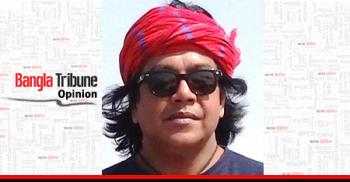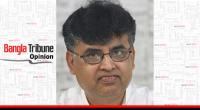 It is a great honour that I have spent over forty years of my life with the bauls of Bangladesh. I have not limited myself to Incorporating their music into jazz-rock fusions to explain the intrinsic beauty of their life to an urban audience. I have lived with them for years, befriended hundreds, and stood up for their causes. I have researched and written many articles on baul music-- as well as authored a book in English which was published in 2016.
It is a great honour that I have spent over forty years of my life with the bauls of Bangladesh. I have not limited myself to Incorporating their music into jazz-rock fusions to explain the intrinsic beauty of their life to an urban audience. I have lived with them for years, befriended hundreds, and stood up for their causes. I have researched and written many articles on baul music-- as well as authored a book in English which was published in 2016.
Without knowing anything about who they are, and what they represent, it is not unusual for city bred people to have 'great admiration' about bauls. Likewise, globally there has been a surge in genuine appreciation of Baul music, given that the corpus of Fakir Lalon Shah's (1772-1890) work earned Bangladesh an entry into the UNESCO list of 'Intangible Cultural Heritage of Humanity' in 2005.
There were good reasons behind the accolade. Lalon, considered the most celebrated Sage of our times, has rarely missed an opportunity to capture center stage of Bengali imagination in the hundred- plus years that he lived, and 128 years since he died. He has inspired the likes of Rabindranath Tagore and Kazi Nazrul and a host of other literary and cultural luminaries of the preceding century. Of particular interest: at any juncture of our recent history, whenever we are faced with any crisis that threatens peace and leads to religious fratricide, it is the secular and humane words of Lalon that resonate constantly and act as a balm to heal and draw people back into unity.
It needs to be admitted that popular urban narratives about bauls are flawed and backed by the flimsiest of research efforts. Tragically in most cases they revolve around an attitude of snobbish patronization which is repulsive and condescending. I will try to outline a few popular misconceptions here:
* 'Bauls are singing beggars who live on handouts:' Undeniably they represent the poorest of the poor in Bangladesh's social strata, but to say they are 'beggars' is disrespectful. Let us not forget that bauls are indeed the 'intellectual elite' of rural Bangladesh. Most of them sing for a living and their professionalism and skills - are as good as any of their city bred counterparts. For lack of patronage of any kind, they are compelled to informally 'stage' their performance under a tree or in village fairs where thousands throng to hear them sing, and donate money to encourage them. They do not in principal and by virtue of their spiritual upbringing, solicit 'alms' of any kind. In fact, they go about their business in as unobtrusive a fashion, as would street singers and musicians anywhere in Europe or USA.
* 'Baul music and philosophy is a dying tradition and needs urban intervention for survival': Nothing can be further from the truth. Bauls predate Lalon and their folk singing traditions are nearly 700 years old. Essentially an oral tradition, they have kept themselves 'alive' through the ancient school of Guru-Siswa Parampara or teacher-students interaction. Every Baul worth his name has to live for years under the strict tutelage of a Guru in an akhara - which are literally regimentation centers. It is here, that other than music, they are trained to attain dibyo gyan (deep wisdom) into the rigorous praxis of comprehending esoteric philosophy and spirituality associated with their music. It is not the pretentious urban pundits, but the existence of the ancient Shadhu Shongo (Conclave of the Wise) institution, where bauls ritually congregate at the Shrine of various Gurus, that has kept their culture 'alive'. Unknown to many, in rural Bangladesh over a thousand such Conclaves are held each year which are supported financially and materially by communities themselves, with little or no assistance from the State or other stakeholders.
* 'Inclusion of Western instruments and fusion into Baul music has completely destroyed its authenticity': This insinuation by many urban pundits and cultural vigilantes is load of hogwash. IT IS conveniently overlooked that not only Baul music - but its basic spirituality too revolves around 'fusion'. Unmistakably it is 'fusion of faith' unheard of anywhere in the world - that has made bauls globally acceptable. Their efforts at promoting the best of Buddhism, Vaishnavite Hinduism, Sufi Islam and Christianity, as also a 'coherent' belief in one omnipotent God of all mankind - and not just any 'religion', is constantly repeated in the verses of Lalon.
Back to Baul Music history: during the times of Lalon, only the ektara and baya were used for accompaniment, and the art form limited to Sadhus (seekers) was seldom heard beyond the akhara precincts. However, over the years together with invention of microphones and sound systems, many new instruments such as the dotara, flute, harmonium, dhol, mondira, esraj, violin etc came in and became mainstay in Baul music. In the late 1930's Baul music entered our homes via All India Radio and there has been no turning back ever since.
Baul philosophy revolves around the principals of Sahajiya or the 'simple and easy path'. There is nothing 'rigid' about it. That said, there are no 'hard and fast rules' as how Baul music has to be interpreted or presented. However there are basically three overriding guidelines:
a.) Baul aficionados MUST understand the complexities of the verses before attempting to sing them.
b.) That the core message of the verse with the signature line of the podo korta or lyricist remains intact.
c.) That instruments are merely bahon or 'vehicles' to advance Baul music in changed times. Regardless of whether it is rock, thrash metal, funk, jazz etc, as long as the final composition conveys the complete message of Lalon Shah and other Sages to a wider audience, specially globally - any and all incorporations of instruments, experimentation and genre is permissible.
There is only one all encompassing philosophy among Baul's - that of jogot mukti or 'eternal liberation'. It means liberation from rigidity of our thoughts, actions and the way we perceive life and go about living it as well as stripping ourselves from the greatest human sin - Ego! In short Baul music is a combination of gaan i.e. music and gyan or wisdom. To end, these are simple yet complex lessons we in the urban centers need to learn from the 'poor' in our grassroots. Joy Guru!
Maqsoodul Haque (Mac) is a columnist and a jazz-rock fusion musician. He is author of the book "Bauliana- Worshipping the Great God in Man" published by Agradoot Ltd in 2016.
 Opinion
Opinion
30755 hour(s) 43 minute(s) ago ;
Morning 06:37 ; Saturday ; Apr 20, 2024
Baul music, philosophy and the urban narrative
Send
Maqsoodul Haque
Published : 18:36, Sep 18, 2018 | Updated : 18:37, Sep 18, 2018
Published : 18:36, Sep 18, 2018 | Updated : 18:37, Sep 18, 2018
0 ...0 ...
/hb/
Topics: Top Stories
***The opinions, beliefs and viewpoints expressed in this article are those of the author and do not reflect the opinions and views of Bangla Tribune.
- KOICA donates medical supplies to BSMMU
- 5 more flights to take back British nationals to London
- Covid19: Rajarbagh, Mohammadpur worst affected
- Momen joins UN solidarity song over COVID-19 combat
- Covid-19: OIC to hold special meeting
- WFP begins food distribution in Cox’s Bazar
- WFP begins food distribution in Cox’s Bazar
- 290 return home to Australia
- Third charter flight for US citizens to return home
- Dhaka proposes to postpone D8 Summit
Unauthorized use of news, image, information, etc published by Bangla Tribune is punishable by copyright law. Appropriate legal steps will be taken by the management against any person or body that infringes those laws.
Bangla Tribune is one of the most revered online newspapers in Bangladesh, due to its reputation of neutral coverage and incisive analysis.
F R Tower, 8/C Panthapath, Shukrabad, Dhaka-1207 | Phone: 58151324; 58151326, Fax: 58151329 | Mob: 01730794527, 01730794528


